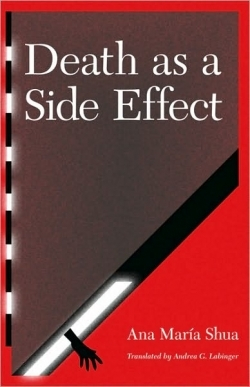Death as a Side Effect
“No one can humiliate you like your parents. No one else in the world has that tremendous power: the same power we have over our own children.” So declares Ernesto, the antihero in Ana María Shua’s latest novel, whose relationship with his father is marked by as much petulance, impassioned, well-articulated animosity, and resignation as that found in Kafka’s Letter to His Father. Death as a Side Effect similarly portrays a narrator wrestling with an imposing personality as well as with himself, revealing the psychological games that have characterized their encounters for decades.
Selected by the Congreso de La Lengua Española as one of the one hundred best Latin American novels published in the last quarter-century, Shua’s novel pits Ernesto’s cruel, pragmatic, yet honest desire for his father’s death against daily events in a society in which travel must be conducted by armored taxis, and where the threat of convalescent homes, the rise of tell-all documentaries, the Suicide Channel, and attacks by professional thieves are commonplace. Though the premise is simple—beginning with a reflection on Señor Kollody’s tumor and slowly navigating toward Ernesto’s realization that his father is not only surviving, but recovering from surgery—it is further enriched by secondary characters such as a transgendered television personality; a “genius” filmmaker whose project is constantly under revision; and the absent lover to whom the entire work is addressed, among others. Shua forgoes campiness in favor of a more shaded approach, combining humor with gravitas, and allowing absurdities to flourish alongside the problems of a family fractured by its own dysfunctional habits.
Readers familiar with Shua’s earlier microfiction will recognize some of her hallmarks: hints of eroticism; gentle stabs at masochistic characters (exemplified by Ernesto’s sister, Cora, who has never untangled herself from the household and whose pleasures in life are seemingly few); settings that are firmly grounded in reality even as they are subtly altered to seem otherworldly; and the enticing, dark sensibility that allows serious events to vault off the page, such as the institutionalized care of an aging pater familias serving as fodder for a staged kidnapping, or the aftermath of a home invasion leading to a girlfriend’s affair. All plot twists aside, however, Shua’s finest moments occur when she portrays individuals confronting the spectre of death in their own very personal ways, or as a son’s initial resentment ultimately dissolves when he discovers an epistolary—and far more enduring—means of escape.
Reviewed by
Karen Rigby
Disclosure: This article is not an endorsement, but a review. The publisher of this book provided free copies of the book to have their book reviewed by a professional reviewer. No fee was paid by the publisher for this review. Foreword Reviews only recommends books that we love. Foreword Magazine, Inc. is disclosing this in accordance with the Federal Trade Commission’s 16 CFR, Part 255.

